|
|
|
Sort Order |
|
|
|
Items / Page
|
|
|
|
|
|
|
| Srl | Item |
| 1 |
ID:
166543
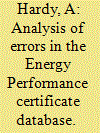

|
|
|
|
|
| Summary/Abstract |
Energy Performance Certificates (EPCs) are the adopted method by which the UK government tracks the progress of its domestic energy efficiency policies. Over 15 million EPCs have been lodged, representing a valuable resource for research into the UK building stock. However, the EPC record has a reputation of containing multiple errors. In this work, we identify many such errors and quantify how common they are. We find that 27% of EPCs in the open EPC record display at least one flag to suggests it is incorrect and estimate the true error rate of the EPC record to be between 36 and 62%. Many of these errors are caused by EPC assessors disagreeing on building parameters such as floor type, wall type and built form. Additionally, flats and maisonettes appear to cause more issues than other property types. This may be due to difficulties in assessing their location in the building and the nature of the surrounding space. We also suggest potential new methods of quality assurance which rely on machine learning and which could allow such errors to be avoided in the future.
|
|
|
|
|
|
|
|
|
|
|
|
|
|
|
|
| 2 |
ID:
111866
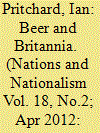

|
|
|
|
|
| Publication |
2012.
|
| Summary/Abstract |
Prior to industrialisation, there was a nebulous and fragmented Welsh national character or mass collective identity. Industrialisation engendered significant sociocultural upheaval and change, and for this 'new' society to function effectively a cohesive Welsh identity had to emerge. Because the impetus behind industrialisation had occurred primarily in a British context, any newly formed Welsh identity would ultimately have to be reconciled to the nation's industrial import within a 'United Kingdom'. Mass cultural commonalities and the role played by leisure in this procedure is a core element in the establishment of industrial modernist nation-states. Therefore, this article argues that public-house culture played a central role in the construction of a new industrial Welsh national ideology that was ultimately allied to, and a constituent of, a British imperial agenda designed to exploit both the natural resources and workforce of the area to its maximum extent.
|
|
|
|
|
|
|
|
|
|
|
|
|
|
|
|
| 3 |
ID:
105872
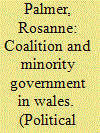

|
|
|
|
|
| Publication |
2011.
|
| Summary/Abstract |
Post-devolution Wales has had experience of a variety of different types of government and a variety of different parties in government; single party rule with one party gaining an overall majority of the seats (Labour, 2003-05), minority administrations (Labour, 1999-2000, 2005-07) and coalitions between Labour and the Liberal Democrats (2000-03) and Labour and Plaid Cymru (2007 to date). This article explores the experiences of both minority and coalition government in Wales, focusing most notably on the convoluted process of coalition formation in 2007, before proceeding to draw lessons for the United Kingdom coalition government based upon developments in Wales.
|
|
|
|
|
|
|
|
|
|
|
|
|
|
|
|
| 4 |
ID:
132604


|
|
|
|
|
| Publication |
2014.
|
| Summary/Abstract |
The United Kingdom is aspiring to reduce the carbon emissions in the building sector, aiming to achieve nearly zero carbon buildings by 2020. The policy models in England and Wales rely on three strands: regulations; financial incentives and educational schemes. A growing body of literature suggests that the building industry is facing several barriers that hinder the delivery of the expected carbon targets outlined at policy level. This research explores the enactment of the policy aspirations by building designers using a bottom-up approach. An ethnographic study was conducted to analyse the design process of six non-domestic buildings. The work identified the designers× responses to adopt the policy agenda in routine design and overcome the challenges that emerged during the design process. The understanding of the designers× responses could inform the policy model and suggest areas that need attention for the timely delivery of the expected carbon reductions.
|
|
|
|
|
|
|
|
|
|
|
|
|
|
|
|
| 5 |
ID:
122169
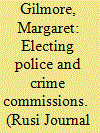

|
|
|
|
|
| Publication |
2012.
|
| Summary/Abstract |
In mid-November 2012, elections will be held in each police force area in England and
Wales, apart from London, for the post of police and crime commissioner. Senior police
officers suggest it will be the biggest shake-up since the first police force was established
by Sir Robert Peel in the early nineteenth century. The government believes the new PCCs
will empower local communities to decide policing priorities in their areas; critics fear
the move is politicising policing and may prove detrimental to national policing needs.
Margaret Gilmore investigates the challenges and the likely impact of this new approach
|
|
|
|
|
|
|
|
|
|
|
|
|
|
|
|
| 6 |
ID:
150446


|
|
|
|
|
| Summary/Abstract |
This paper investigates the effect of Energy Performance Certificate (EPC) ratings on residential prices in Wales. Drawing on a sample of approximately 192,000 transactions, the capitalisation of energy efficiency ratings into house prices is investigated using two approaches. The first adopts a cross-sectional framework to investigate the effect of EPC rating on price. The second approach applies a repeat-sales methodology to investigate the impact of EPC rating on house price appreciation. Statistically significant positive price premiums are estimated for dwellings in EPC bands A/B (12.8%) and C (3.5%) compared to houses in band D. For dwellings in band E (−3.6%) and F (−6.5%) there are statistically significant discounts. Such effects may not be the result of energy performance alone. In addition to energy cost differences, the price effect may be due to additional benefits of energy efficient features. An analysis of the private rental segment reveals that, in contrast to the general market, low-EPC rated dwellings were not traded at a significant discount. This suggests different implicit prices of potential energy savings for landlords and owner-occupiers.
|
|
|
|
|
|
|
|
|
|
|
|
|
|
|
|
| 7 |
ID:
124135
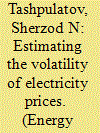

|
|
|
|
|
| Publication |
2013.
|
| Summary/Abstract |
Price fluctuations that partially comove with demand are a specific feature inherent to liberalized electricity markets. The regulatory authority in Great Britain, however, believed that sometimes electricity prices were significantly higher than what was expected and, therefore, introduced price-cap regulation and divestment series. In this study, I analyze how the introduced institutional changes and regulatory reforms affected the dynamics of daily electricity prices in the England and Wales wholesale electricity market during 1990-2001.
This research finds that the introduction of price-cap regulation did achieve the goal of lowering the price level at the cost of higher price volatility. Later, the first series of divestments is found to be successful at lowering price volatility, which however happens at the cost of a higher price level. Finally, this study also documents that the second series of divestments was more successful at lowering both the price level and volatility.
|
|
|
|
|
|
|
|
|
|
|
|
|
|
|
|
| 8 |
ID:
118226
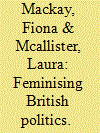

|
|
|
|
|
| Publication |
2012.
|
| Summary/Abstract |
Modest levels of female representation at the House of Commons are in sharp contrast to the Nordic-levels of representation achieved in the Scottish Parliament and the National Assembly for Wales since devolution in 1999. One apparent advantage of devolution is the opportunity that it provides for lesson-learning across jurisdictions. This article offers six lessons on women's political representation-three positive and three negative-drawn from the experience of devolution in Scotland and Wales. We draw conclusions from these lessons, including the need to keep parties under scrutiny to ensure they deliver on their rhetorical commitments. We also postulate that gender equality might prove too important to be left to political parties and consider whether there is a need to consider stronger measures such as mandatory quotas.
|
|
|
|
|
|
|
|
|
|
|
|
|
|
|
|
| 9 |
ID:
155416


|
|
|
|
|
| Summary/Abstract |
This article explores how a devolved government in a small country, faced with external constraints beyond its immediate control, can deploy policy resources to shape a distinctive approach to public services. We analyse recent homelessness policy in Wales using the NATO (Nodality, Authority, Treasure, Organisation) typology of tools of government proposed by Hood and Margetts, and show how this can be applied usefully to understand the choices that governments must make in conducting relationships with other institutions. We conclude that a combination of Nodality and Authority provide powerful resources for a subnational government which has only limited formal powers and fiscal autonomy.
|
|
|
|
|
|
|
|
|
|
|
|
|
|
|
|
| 10 |
ID:
105810


|
|
|
|
|
| Publication |
2011.
|
| Summary/Abstract |
The UK has enviable renewable resources, both onshore (wind) and offshore (wind, wave and tidal) (The Offshore Valuation Group, 2010). The government has had policy mechanisms in place since 1990 to encourage these resources to be developed. The current mechanism, the Renewables Obligation (RO), was specifically designed to emphasise competition and therefore to fit in with the UK's overall strategic approach to energy policy. However, as yet, it has not delivered the capacity that it was designed to do, and as a result the UK faces a difficult challenge in attempting to meet European-wide renewable energy targets for 2020, as well as longer term decarbonisation targets. This paper explores some of the major reasons why the RO has performed so poorly to date and considers the prospects for improvement up to 2020. It concludes that the strategic emphasis on competition in the support mechanisms has played a key role in limiting renewables development, but that the mechanism has changed significantly since it was introduced. However, these changes, together with proposals for electricity market reform, still do not address important elements of risk in comparison with a standard Feed In Tariff.
|
|
|
|
|
|
|
|
|
|
|
|
|
|
|
|
| 11 |
ID:
138884


|
|
|
|
|
| Summary/Abstract |
This article analyses political attitudes to the union in England, Scotland and Wales after the Scottish independence referendum. Using public opinion data, we explore constitutional preferences and perceptions of national grievance, before examining the role that national identity plays in structuring preferences. Our evidence shows that considerable demand exists for nationally demarcated forms of government within the UK, although these constitutional preferences do not translate in support for policy diversity across the UK. We also find evidence that these constitutional preferences relate closely to national identity, but relate also to appeals to national interest.
|
|
|
|
|
|
|
|
|
|
|
|
|
|
|
|
| 12 |
ID:
126312


|
|
|
|
|
| Publication |
2013.
|
| Summary/Abstract |
A year ago, policing in England and Wales underwent a monumental change with the first direct elections of police and crime commissioners (PCCs). Yet the establishment of this new post and the roles and responsibilities of these newly elected officials were little understood by voters at the time and turn-out was extremely low. A year on, Margaret Gilmore looks at how the new PCCs fared in their first year and analyses a YouGov poll on how the public's perceptions have changed now that PCCs are a reality.
|
|
|
|
|
|
|
|
|
|
|
|
|
|
|
|
| 13 |
ID:
096759


|
|
|
|
|
| Publication |
2010.
|
| Summary/Abstract |
This article gives a prosecutor's perspective on the practical application of UK terrorism legislation. It gives an overview of the working relationship between the Counter Terrorism Division's specialist prosecutors, police officers and the intelligence services, in order to outline some of the challenges in investigating and prosecuting terrorism cases, and to inform on prosecutorial decision-making. It summarizes the main additions and changes to the criminal terrorism legislation over the last decade and gives examples of how some of the key powers and offences have been approached and used by prosecutors. The article deliberately concentrates on the criminal aspects of terrorism legislation and the importance of using due process to prosecute alleged terrorists fairly and proportionately. It describes how prosecutors use a mixture of the ordinary criminal and specialist terrorism laws depending on what is deemed appropriate in any given case. It is not intended to be a critique of the legislation itself or an analysis of what may or may not need to be changed. That is a matter for Parliament; the prosecutor's role is to apply the law not to make it. The article concludes that the criminal justice system is the correct place for terrorism prosecutions to take place and that the UK can continue to retain due process and respect for human rights while seeking properly to protect national security.
|
|
|
|
|
|
|
|
|
|
|
|
|
|
|
|
| 14 |
ID:
190116


|
|
|
|
|
| Summary/Abstract |
In 2008 Joe Calzaghe (from Wales) fought Bernard Hopkins (from the USA) in a light-heavyweight boxing match. Prior to the fight Hopkins had taunted Calzaghe with the refrain that he would never lose to a white boy. This paper assesses the interplay of discourses surrounding race and nation in the build-up to the contest between the two boxers. The analysis highlights how simplistic binaries are used to perpetuate notions of difference and considers how this accentuates divides in contested racial and national terrains.
|
|
|
|
|
|
|
|
|
|
|
|
|
|
|
|
| 15 |
ID:
086976


|
|
|
|
|
| Publication |
2009.
|
| Summary/Abstract |
This essay argues that the Barnett formula-which determines the block grant paid annually by the UK government to each of the Devolved Administrations of Scotland, Wales and Northern Ireland-be reformulated, guided by the following principles: fiscal equity, accountability, transparency, and flexibility. The rationale for change is that the current fiscal arrangements make little policy sense and may not be sustainable in a changing political and economic context. The formation of a grants commission to help develop data, calculate disparities, and provide public advice to the Chancellor of the Exchequer is also advocated.
|
|
|
|
|
|
|
|
|
|
|
|
|
|
|
|
| 16 |
ID:
171528


|
|
|
|
|
| Summary/Abstract |
This paper problematizes the uneven nature of low carbon energy transitions in the context of uneven geographical development and core/periphery asymmetries. It explores the impacts of transition for peripheral communities lacking political power and agglomerative advantages. While decentralised developments that emerge with energy transition promise to bring new opportunities to remote areas, factors of economic and political inequalities render those opportunities socially and spatially segregated. Exploring experiences of rural and exurban communities in South Wales, the paper establishes links between low carbon transition and its actually existing implications on the ground. It demonstrates that even if having an abundance of natural resource and physical space to harness low carbon energy, many rural communities are trapped in the chronic positions of energy peripheralization.
|
|
|
|
|
|
|
|
|
|
|
|
|
|
|
|
|
|
|
|
|